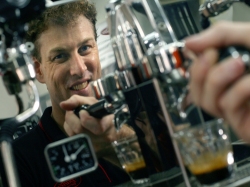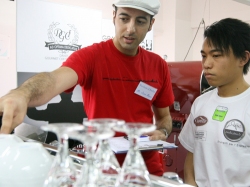| South China Morning Post 17 July 2009 |
|
LIFE | By Vivian Chen Brewed awakening
Chan Tsz-king hopes to change that perception. I don't think Hong Kong has a solid coffee culture yet, says the 26-year-old barista, who works at a trading company's in-house cafe. For me, real coffee shouldn't be served in a giant plastic cup or drunk through a slim straw. Many people are now buying caffeine rather than a cup of real enjoyment. One of 17 people taking part in the city's first barista contest, Chan presents a picture of concentration during the elimination rounds last week. After handing each judge a cup of freshly roasted beans, he presses a button on his music player to send a jazzy tune wafting through the room before packing the ground beans to produce his first cups. Contestants are each required to produce four black coffees, four milk coffees and four lattes with an identical design on the foam within 12 minutes, and the six finalists will compete tomorrow for the title of Hong Kong Grand Barista Champion. Paul Jackson, founder of Australian gourmet coffee company Danes, organised the original competition in Sydney eight years ago to promote excellence in espresso-based drinks and raise industry awareness. Since then, it has expanded to take in Thailand, South Korea, Singapore and now Hong Kong. The Hong Kong winner will be flown to Sydney to take part in the final next month, with the grand champion awarded a trip to Milan. Craig Jackson, Paul's brother and a long-time Hong Kong resident, hopes the local competition will help bring baristas into the limelight here. This city is still at a stage where people have just started to recognise the importance of baristas and are learning to drink espresso instead of instant coffee. I hope we can give baristas here the credibility that they really deserve. Coffee trader Mark Tse King-wing says: Espresso is the true connoisseur's choice - the aftertaste that gradually spreads in your mouth is what all coffee lovers crave. An experienced barista who runs occasional classes for his clients, Tse reckons there aren't many trained people in Hong Kong who can brew a proper espresso. There is no barista association in Hong Kong at the moment, which is a pretty sad thing, he says. It's important that we can have a platform for local baristas to meet and communicate. The competition may well spur the formation of such an organisation. With a blog and Facebook group set up for easy interaction, contestants such as Chan are starting to learn from each other. Most are young and relatively inexperienced, but they're a passionate crowd who see themselves as missionaries. Baristas are at the front line to advocate coffee culture, says Mose Ng Ka-kin, 24, who works for a coffee supplier. Each step matters - where the beans came from, how they're stored and all the way through to the brewing process. Even the slightest flaw will change the taste and the look. For 19-year-old Bruno Koo Tin-long, whose family is in the restaurant business, coffee is art. Coffee isn't just a drink. There are so many variations to explore. Baristas are so focused on perfecting each cup - it's very artistic to me, he says. Tracy Kwok Tsui-sim, a 24-year-old barista at a Wan Chai coffee bar, went to great lengths to prepare for the contest, testing various beans to find the right blend for her espresso. Her job has been a wonderful journey of discovery, she says. I never expected there to be so many things to learn about coffee. It's like opening a door and discovering a whole new world. Assessing their brews tomorrow will be a panel of five judges. Barry Yuen Chi-tak, founder of the Coffee & Tea Academy of Hong Kong, Lena Tsang Yu-xian, vice-president of the Caffe Habitu chain, and Sanjay Ponnapa, founder of Fuel Espresso, will rule on taste and presentation, while Jason Moses, manager of local supplier Glory Coffee and Margaret Choy from Danes will award points on technical aspects such as the correct use of espresso machines. Comparing a barista's role to that of a conductor, with coffee beans as the composition and brewing equipment as the orchestra, Jackson says a skilled barista makes all the difference in producing a proper espresso, which should give an aromatic balance of the sweetness, bitterness and acidity of the beans used, and be presented with appropriate grace.
It made a convert of Ed Lam Sze-ho. The 23-year-old contestant used to think coffee as just something bitter and strong to get him started in the morning before he had his first perfect cup. It was just a plain, simple espresso. The taste was so rich and so pure. I could taste the original features of the beans and the bitterness wasn't exaggerated at all. It was a cup of well-rounded flavours, says Lam, who has been a barista for two years. You may get hints of chocolate, cigar or vanilla in different beans. It's up to the baristas to really bring out the original flavours. Like many of the young baristas, Lam is keen to open his own coffee shop one day. I hope when you open the door of my cafe, you will be welcomed by a rich coffee aroma that will light up your day. I won't need a sign to tell people it's a coffee shop. I'll let my coffee speak for itself. That will be my dream cafe, he says. Lam acknowledges he has yet to acquire the depth of skill and experience to start his own business but says, Growing into a better barista is a dynamic process. Isn't that the most exciting part? |
 Cafe chains mushrooming in almost every district in the city give an indication of how much coffee culture has grown here. But to many people walking out with a steaming cup of java, a barista is just the person who serves them a shot of caffeine rather than someone skilled at making espresso-based drinks.
Cafe chains mushrooming in almost every district in the city give an indication of how much coffee culture has grown here. But to many people walking out with a steaming cup of java, a barista is just the person who serves them a shot of caffeine rather than someone skilled at making espresso-based drinks. A perfectly brewed espresso has the colour of fresh chestnuts with a light, creamy texture, he says. The aroma is intense and pure. No matter how strong the coffee is, the flavour disappears and only the aroma remains as you finish the drink.
A perfectly brewed espresso has the colour of fresh chestnuts with a light, creamy texture, he says. The aroma is intense and pure. No matter how strong the coffee is, the flavour disappears and only the aroma remains as you finish the drink.


